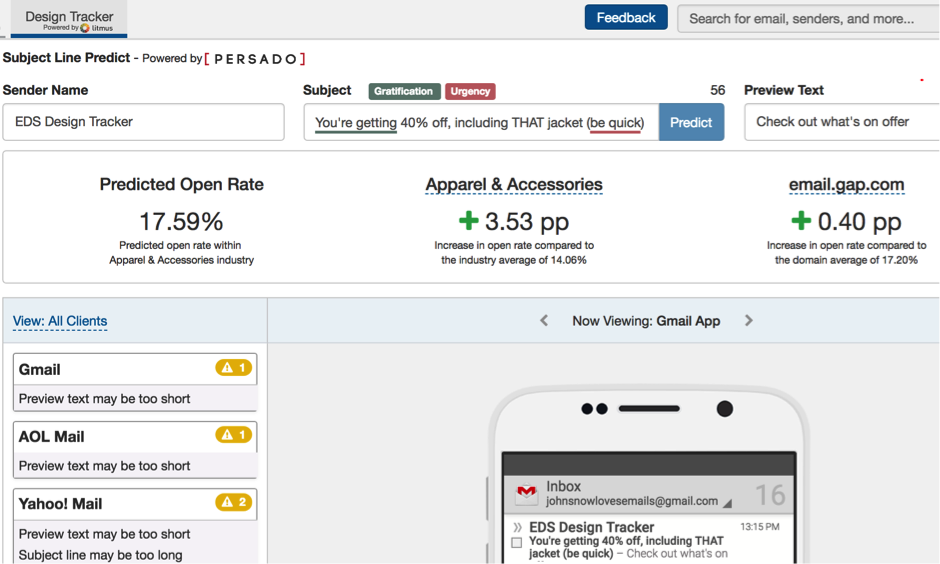Kath Pay: To resend or not to resend? The data says yes!
One of the recent topics on the Only Influencers email discussion group is whether to resend marketing emails to non-openers. (To read this or any OI past discussion, consider becoming a member of Only Influencers. If you are a brand, you might even qualify for a free membership.)
The benefits are clear, especially if you rely on broadcast email to deliver revenue:
- You extend your reach with your broadcast email at minimal expense. Inboxes are crowded places these days, and it's easy for your email to get overlooked in the heat of the moment, as in the upcoming holiday shopping frenzy.
You don't need to spend time or money on new creative content, aside from developing a new subject line (see the next point).
- You appeal to audiences that might not have responded to your first email because the subject line did not line up with their personalities or interests.
I explain this idea in depth here. In essence, shoppers fall into one or more of four basic types: competitive, spontaneous, humanistic and methodical, based on their needs, motivations and emotions. Resending your email gives you a chance to reach a different audience with a revised subject line and potentially tapping into a different emotion (see below).
- You generate incremental conversions and revenue from customers who did not open or act on your emails the first time around.
Even if your email reached the right audience, your customers might not have been ready to act. A resend email can be a helpful reminder to act, especially before a promotion expires.
Much depends on the subject line
The most important thing is to be strategic in your choice of subject line. Your goal is to find a subject line that connects with audiences who didn't connect with your first choice.
You probably don't have time to do standard subject-line testing on live audiences for a resend. In fact, I’m not sure that it’s advisable. But choosing the right subject line is crucial, so we recommend using a virtual subject line testing tool such as eDataSource's (EDS) Subject Line Predict or Touchstone's subject line tool to gauge the potential effect of dozens of different subject lines without actually sending to your audience.
Persado powers EDS’s Subject Line Predict and enables you to identify which emotions your subject-line options are tapping into. This lets you identify which emotions or personality characteristics you're reaching successfully, as you can see in the screenshot below (see "Gratification" and "Urgency").

Observations from 3 client campaigns
One of the issues that holds marketers back from resending emails to people who didn't open or click is the fear of backlash – unsubscribes or spam complaints. Others speculate that conversions or follow-on revenue won't be enough to offset the spectre of increased churn.
A study based on three campaigns I performed for a client shows those fears were generally unfounded. Here's what we learned, beginning with process metrics, which measure the activity on the email:
- Unsubscribes: Every email send will generate some unsubscribes. Do resend emails generate significantly higher unsub rates, though? Not according to our data, which shows rates varied no more than a fraction of a percentage point across the three campaigns.
- Open rate: Yes, the open rate declined for the resend campaign, but this is to be expected. However, the open reach increased between 35% and 46% across all three campaigns.
- Click rate: The click rate on the resend email also was lower on the resend than on the original email. However, click reach increased, providing an additional 12% to 30% of clicks across all three campaigns.
The three resend emails also performed well on output metrics tied to goals and outcomes:
- Transactions: The number of transactions increased between 34% and 41% across the three campaigns.
- Revenue: Each of the resend emails drove additional revenue, ranging from 36% to 41% of the total revenue for each campaign.
- Revenue per 1,000 emails: Revenue per 1,000 emails decreased slightly, providing 64% to 84% of the original RPM value.
- Conversion rate: Here's the most interesting statistic of our study. It increased massively in each of the three campaigns.
In Campaign 1, the conversion rate on the original email was 6.46% and 12.75% on the resend (a 197% lift). In Campaign 2, the conversion rate was 4.75% on the original email and 7.6% on the resend (a 160% lift). Campaign 3 was the eye-popper: 1.99% conversion rate on the original email and 7.76% on the resend (a 390% lift).
From this finding, we can then start to formulate some hypotheses to try to explain why this would be so. Exciting times!
Conclusion: 3 reasons to test it on your next campaign
For my client, following a strategically designed program of email resends paid off, in no small part due to creating and testing hypotheses about elements that would drive better results and using virtual subject lines testing instead of sending the same email word for word or switching gears without testing.
Here's what you can take away from these results:
- Resending an email campaign provides a great opportunity to reach out again to your subscribers who did not open or click on the original email.
- If you aren't doing it, you are leaving money on the table as well as bypassing an opportunity to generate engagement statistics that can sustain or improve your deliverability and inbox placement.
- The secret lies in the subject line. Spend time to create and test subject lines that will resonate with your audience, considering their needs, motivations, emotions and personalities.
As the saying goes, your mileage might vary from what my client saw. But you'll gain nothing if you don't try it. Give it a shot and let me know your results!

 How to resolve AdBlock issue?
How to resolve AdBlock issue? 